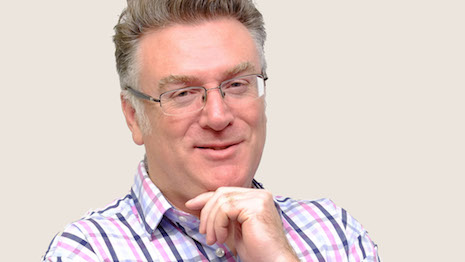 Alan Dykes is head of digital marketing at Archant Dialogue
Alan Dykes is head of digital marketing at Archant Dialogue
By Alan Dykes
The automotive sector is going through major upheaval.
Challenges span emerging technology, vehicle design and marketing communications, and the level of manufacturer investment required to succeed in each is eye watering.
Changing consumer use of – and trust in – information channels, and the shift from internal combustion to electric or hybrid engines, alongside advances in autonomous driving and artificial intelligence means good information is absolutely key.
With upheaval comes opportunity. Manufacturers and dealers that embrace better communication will thrive. Nowhere is that more crucial than the luxury market.
Recognizing the luxury trailblazers
Luxury consumers are trailblazers when it comes to both new technology and communication. Everett Rogers’ oft-quoted Diffusion of Innovation theory highlights the reason why.
Rogers’ theoretical model demonstrates how innovative products and services are adopted, with successive groups of consumers purchasing or using them over time as the product eventually reaches mass market, if indeed it is a desirable innovation.
The first two groups, known as Innovators and Early Adopters, represent just 16 percent of the potential market for new technology. However, the fact they will pay more for, and say more about, prototypes is highly influential on later adopters.
High discretionary income allows luxury consumers to be these early adopters, not least in the big-ticket automotive arena.
The international SUV market was blown open by luxury cars from luxury brands, not traditional SUVs from established manufacturers. The trend then went mass-market.
Electric vehicles are the new luxury play. The best in market are expensive – but they have a bigger battery to ease range anxiety, good looks and striking performance, all of which will drive sales as much as a desire to drive “greener” cars.
Getting these high performance luxury cars on the road is very important as a first step if electric cars are to hit the mass market – Rogers’ so-called Early and Late Majorities and eventually the Laggards.
Putting the brakes on bad trust
A lot of change is happening right now, but is it being well communicated?
We recently asked a United Kingdom-representative panel of 1,000 consumers for their thoughts on automotive marketing. Our research reveals a stark truth: more than a quarter – 26 percent – don’t trust automotive marketing.
All car brands, but particularly luxury marques, must embrace innovation or risk being shut out of customers’ minds.
Done correctly, automotive marketing can build trust-based relationships and two-way communication.
Getting it wrong, though, breeds serious problems.
Look at previous manufacturer communications. Much can be considered misleading: unrealistic miles per gallon expectations; content depicting cars with higher specs than the listed price model; and over-hyped lifestyle campaigns.
Traditional advertising scored poorly with our panel, with just 6.9 percent naming it trustworthy.
In contrast, word-of-mouth is taken as gospel by 26.5 percent.
Luxury automotive brands must consider the best ways to build trust.
Yet the message will only be driven home if the targeting is right.
The term “luxury” comes with a string of misconceptions and stereotypes. It is not just a homogenous group of wealthy, sophisticated, older shoppers. There are countless subsets in this demographic.
Automotive brands must carefully identify targets and not be afraid to step outside their comfort zones.
Generic marketing is not enough. Luxury consumers increasingly seek information matching their own personal needs.
From communications to communities
Working with our data insight partners Pulsar, we identified how consumers explore purchase options: they research online on a Saturday morning and consider test drives on a Tuesday. This behavior is built around their life and work habits.
So brands must emphasize channels that can effectively engage luxury consumers and generate word of mouth in the right place and at the right time.
Digital is key: WhatsApp and WeChat provide the personal touch, for example.
In Germany, Mercedes has built its communication strategy around WhatsApp, channeling fans’ passion and interest into a community.
The app can facilitate everything from community management to competitions and new releases, building rapport with individual motorists.
Digital can play a key role in terms of retention and loyalty.
Many luxury car brands have online membership organizations that generate positive word of mouth.
Porsche connects with thousands of brand advocates globally via its members club. It provides users with engaging content.
One of Porsche Club GB’s main priorities is to offer exclusive experiences that indulge and excite members. These events build customer affinity and loyalty that elevates and differentiates the brand. The model is also a cost-effective way to reach prospects.
Communications aside, quality customer care must not be forgotten.
A luxury car is a big investment that often requires high maintenance fees and expensive repairs. Convenience is key.
Take Tesla. It has raised the bar with seamless, intuitive services that deliver on consumers’ wants and needs. Its mobile repair service, for example, means drivers can have cars serviced when and where they want. This model truly delivers on luxury customers’ expectations.
Luxury’s pay-off is mass-market gain
Modern luxury automotive brands can strengthen customer connections, but must think beyond traditional advertising and focus on more informative content that is honest, talks to people’s concerns as well as their passions, and regularly contributes to a dialogue.
In automotive, the rapid evolution of digital technology means carmaker marketing must become more agile, current and involved, and not remote and simply product focused.
This means identifying and harnessing luxury consumer demands, then talking authentically to a wider audience about brand benefits.
SUCCEED, AND brands will not only thrill high-end customers. They will be on the road to mass-market adoption of electric vehicles and all the mileage that it brings.
Alan Dykes is head of digital marketing at Archant Dialogue, London. Reach him at [email protected].
